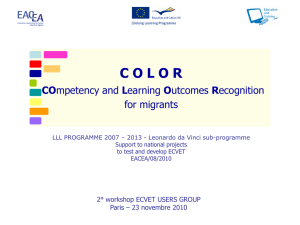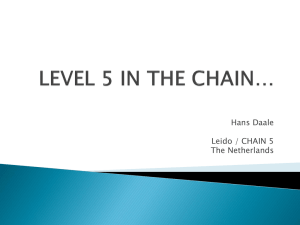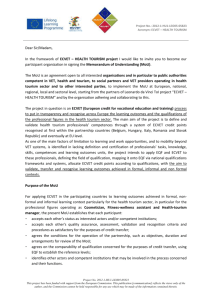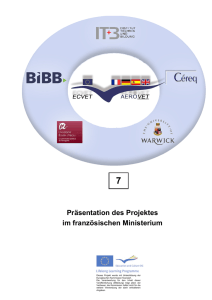7 Presentation Exemplarische Präsentation
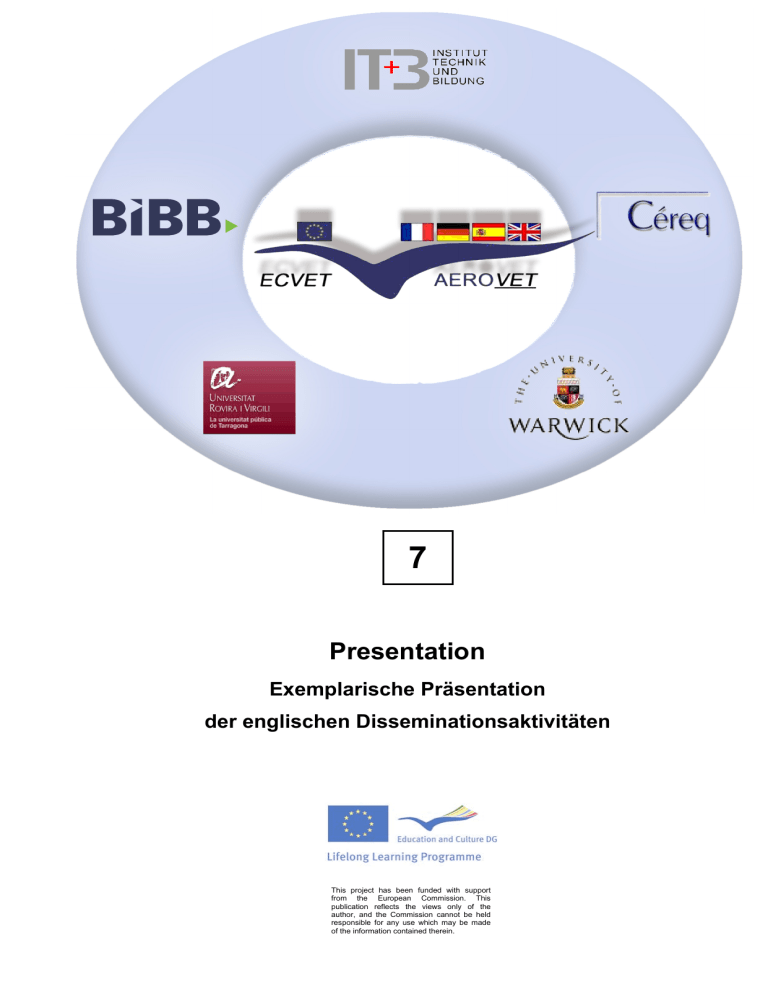
7
Presentation
Exemplarische Präsentation der englischen Disseminationsaktivitäten
This project has been funded with support from the European Commission. This publication reflects the views only of the author, and the Commission cannot be held responsible for any use which may be made of the information contained therein.
Alan Brown
Institute for Employment Research,
University of Warwick.
Institute for Employment Research
University of Warwick alan.brown@warwick.ac.uk
National
system
and
ECVET:
ECVET: part of qualifications of all countries; KSC knowledge, skills and competences
ECVET: transfer (can take LOs between countries); transparency
UK: apprenticeship more work-based (works towards professional competences; running in one company / context – comparisons with
Germany)
UK VET uses modules with credit points
European Commission comes up with ECVET proposal. Does their idea of “transfer, accumulation and recognition of learning outcomes” fit to existing systems.
Does ECVET have a chance to combine the other systems of certifying?
UK
system
often
difficult
to
read
from
Europe
EU specialists find VET in England difficult to grasp:
1. Governance Systems and agencies in flux
2. Partnerships Still not EU ‘social partnership’ model
3. Qualifications Some come, some go;
4. Initiatives Lots, but no clear, shared, sustained strategy across time/political change
5. Awarding bodies Nothing quite like it ….
6. Differences between countries within the UK
View
of
UK
from
Europe
• Rationalising system of qualifications for ages 14-19
• Developing a Qualification and Credit Framework
• Sector skills councils developing qualifications for Labour Market
• Developing national skills academies
• Expanded apprenticeship programmes
• Funding trade union learning representatives
• Published lifelong learning policies in England, Wales, Scotland & NI
• Source: EC 2009
What
we
have
not
told
Europe
Spent 15 years promoting comprehensive competence ‐ based qualifications systems; shift to learning outcomes; universal levels; national qualifications framework
Did not work – have moved beyond a NQF; rediscovered importance of learning processes; reintroduced notional learning hours
Abolished QCDA; introduced a QCF; move from competence ‐ based qualifications with little labour market value towards more substantive qualifications
Qualifications
and
Credit
Framework
(applies
in
England,
Wales
and
Northern
Ireland)
Other
countries
(France;
Germany;
Spain)
• Debate about extent to which they wish to engage with a reform agenda in design of qualifications, such as use of learning outcomes or a competence based approach.
• Disconnect between national goals and systems and
European initiatives and policies.
• Alternative to major changes at national level: emphasis on communicative goals, oriented to the improvement of the match between skills demand and supply.
• This approach would imply rather different routes to establishing or strengthening channels of communication between the labour market and the education and training system.
• ECVET seen as a context for national policy rather than a driver of change.
Possible to engage with process goals of ECVET without full ‐ scale implementation?
• Germany could maintain holistic, more subject/work process oriented approach to qualifications while engaging with a small shift in how competences and learning objectives are framed
• UK: transition from a radical learning outcomes approach, which neglected the importance of learning processes, to a credit based qualifications approach.
• France: major qualifications more holistic approach
• So what are the process goals of ECVET if prospects of a single European system look remote?
• Encourage transparency, mobility, permeability in a way which recognises the importance of context!
Possible
way
forward
1:
Permeability (possible exemption) between VET and HE re LOs
‘consisting of a coherent set of knowledge, skills and competences.’
• partnerships for credit transfer
• using learning outcomes for mobility etc. (some profiles start from core profiles, others start from curriculum)
• do not necessarily have to follow discrete Knowledge, Skills and
Competence format (with credit points)
• should not deal with time – relates more to credit points (workload issues can be handled inside specification, time implicit – UK use notional learning hours)
Possible
way
forward
2:
ECVET could be linked to appropriate qualifications of all countries
Focus on (KSC) knowledge, skills and competences broadly defined – key is level of aggregation – could allow partial transfer in a transparent way.
In the UK the apprenticeship system is heavily work-based, with trainees working towards professional competences and getting these assessed in the workplace, so decisions about where assessment of some Learning Outcomes
(LOs) takes place is often not critical.
Also concerns about double assessment do not seem to allow for the value of demonstrating ability to transfer learning between contexts
Possible
way
forward
3:
AEROVET project examined how well the idea of “transfer, accumulation and recognition of learning outcomes” fits to the existing systems.
Typical Professional Tasks (TPTs) could be used to develop common units and modules to be applied in different national contexts and map them directly against ECVET criteria.
ECVET system designed to enable the attesting and recording of the learning achievements / learning outcomes of individuals, including learning outcomes acquired in different countries,
ECVET designed to operate at the European level, interfacing with national systems and arrangements for credit accumulation and transfer.
Normally, the issue of compatibility will be one of examining how units or modules achieved in one national context could be mapped against each other and the ECVET criteria.
TPTs informed cross-national unit development so helps us understand issues around the most appropriate level of aggregation of tasks to interface with the ECVET system.
Possible
way
forward
4:
Implementing ECVET through an inventory of rules and practices, including formulation of qualifications in terms of learning outcomes, units of learning outcomes, assessment and accumulation of achieved learning outcomes, ECVET points device, taking nonformal and informal learning into account etc. could be overly bureaucratic (compare failure of English NQF system designed on same principles)
Value of a more pragmatic approach where ECVET conveys an approximate value which can be viewed against particular national qualifications
